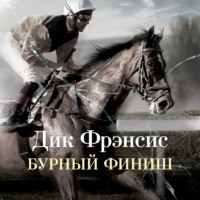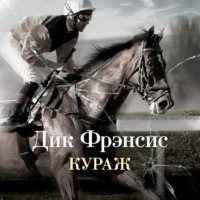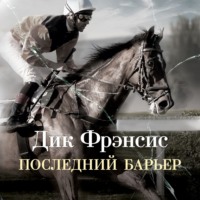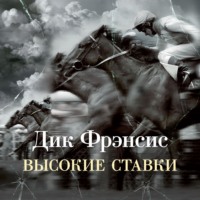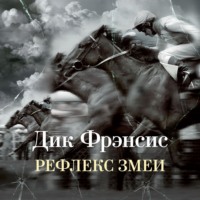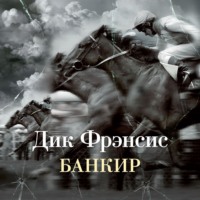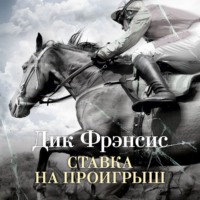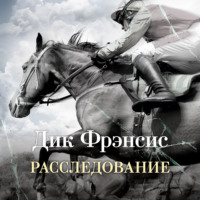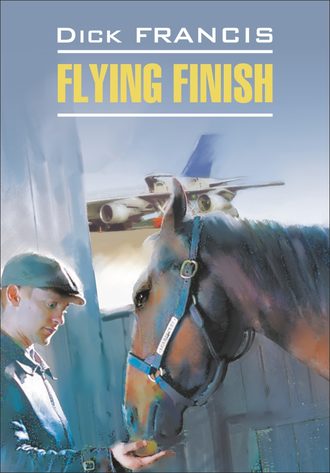
Полная версия
Flying finish / Бурный финиш. Книга для чтения на английском языке
‘Get a carving knife or something from the galley,’ I said. ‘Anything long and sharp. And quick.’
He turned away, stumbling in his haste. The colt’s hind feet smashed one broken half of the back wall clean out. He turned round balefully, thrust his head between the top and centre banding bars, and tried to scramble through. The panic in his eyes was pitiful.
From inside his jerkin Billy calmly produced a large pistol and pointed it towards the colts’ threshing head.
‘Don’t be a bloody fool,’ I shouted. ‘We’re thirty thousand feet up.’
The co-pilot came back with a white handled saw-edged bread knife, saw the gun, and nearly fainted.
‘D… don’t,’ he stuttered. ‘D… d… don’t.’
Billy’s eyes were very wide. He was looking fixedly at the heaving colt and hardly seemed to hear. All his mind seemed to be concentrated on aiming the gun that could kill us all.
The colt smashed the first of the lynch pins and lunged forwards, bursting out of the remains of the box like flood water from a dam. I snatched the knife from the co-pilot and as the horse surged towards me stuck the blade into the only place available, the angle where the head joined the neck.
I hit by some miracle the carotid artery.[140] But I couldn’t get out of his way afterwards. The colt came down solidly on top of me, pouring blood, flailing his legs and rolling desperately in his attempts to stand up again.
His mane fell in my mouth and across my eyes, and his heaving weight crushed the breath in and out of my lungs like some nightmare form of artificial respiration. He couldn’t right himself over my body, and as his struggles weakened he eventually got himself firmly wedged between the remains of his own box and the one directly aft of it. The co-pilot bent down and put his hands under my armpits and in jerks dragged me out from underneath.
The blood went on pouring out, hot sticky gallons of it, spreading down the gangways in scarlet streams. Alf cut open one of the hay bales and began covering it up, and it soaked the hay into a sodden crimson brown mess. I don’t know how many pints of blood there should be in a horse: the colt bled to death and his heart pumped out nearly every drop.
My clothes were soaked in it, and the sweet smell made me feel sick. I stumbled down the plane into the lavatory compartment and stripped to the skin, and washed myself with hands I found to be helplessly trembling. The door opened without ceremony, and the co-pilot thrust a pair of trousers and a sweater into my arms. His overnight civvies.
‘Here’, he said. ‘Compliments of the house.[141]’
I nodded my thanks, put them on, and went back up the plane, soothing the restive frightened cargo on the way.
The co-pilot was arguing with Billy about whether Billy would really have pulled the trigger and Billy was saying a bullet from a revolver wouldn’t make a hole in a metal aircraft. The co-pilot cursed, said you couldn’t risk it, and mentioned ricochets and glass windows. But what I wanted to know, though I didn’t ask, was what was Billy doing carrying a loaded pistol round with him in an underarm holster as casually as a wallet.
Chapter Five
I slept like the dead when I finally got home, and woke with scant time the next morning to reach Kempton for the amateurs’ chase. After such a mangling week I thought it highly probable I would crown the lot by falling off the rickety animal I had in a weak moment promised to ride. But though I misjudged where it was intending to take off at the last open ditch and practically went over the fence before it while it put in an unexpected short one, I did in fact cling sideways like a limpet to the saddle[142], through sheer disinclination to hit the ground.
Though I scrambled back on top, my mount, who wouldn’t have won anyway, had lost all interest, and I trotted him back and apologised to his cantankerous owner, who considered I had spoilt his day and was churlish enough to say so. As he outranked my father by several strawberry leaves[143] he clearly felt he had the right to be as caustic as he chose. I listened to him saying I couldn’t ride in a cart with a pig-net over it and wondered how he treated the professionals.
Julian Thackery’s father caught the tail end of these remarks as he was passing, and looked amused: and when I came out of the weighing room after changing he was leaning against the rails waiting for me. He had brought the list of entries of his horses, and at his suggestion we adjourned to the bar to discuss them. He bought me some lemon squash without a quiver, and we sat down at a small table on which he spread out several sheets of paper. I realised, hearing him discussing his plans and prospects, that the year by year success of his horses was no accident: he was a very able man.
‘Why don’t you take out a public licence?’ I said finally.
‘Too much worry,’ he smiled. ‘This way it’s a hobby. If I make mistakes, I have no one on my conscience. No one to apologise to or smooth down. No need to worry about owners whisking their horses away at an hour’s notice. No risk of them not paying my fees for months on end.’
‘You know the snags[144]’, I agreed dryly.
‘There’s no profit in training,’ he said. ‘I break even most years[145], maybe finish a little ahead. But I work the stable in with the farm, you see. A lot of the overheads come into the farm accounts. I don’t see how half these public trainers stay in business, do you? They either have to be rich to start with, or farmers like me, or else they have to bet, if they want a profit.’
‘But they don’t give it up,’ I pointed out mildly. ‘And they all drive large cars. They can’t do too badly.’
He shook his head and finished his whisky. ‘They’re good actors, some of them. They put on a smiling not-a-care-in-the-world expression at the races when they’ve got the bank manager camping on their door-step back home. Well, now,’ he shufled the papers together, folded them, and tucked them into a pocket. ‘You think you can get next Thursday off to go to Stratford?’
‘I’m pretty sure of it, yes.’
‘Right. I’ll see you there, then.’
I nodded and we stood up to go. Someone had left an Evening Standard on the next table, and I glanced at it casually as we passed. Then I stopped and went back for a closer look. A paragraph on the bottom of the front page started ‘Derby Hope Dead,’ and told in a few bald words that Okinawa, entered for the Derby, had died on the flight from the United States, and was consequently scratched from all engagements.
I smiled inwardly. From the lack of detail or excitement, it was clear the report had come from someone like the trainer to whom Okinawa had been travelling, not from airport reporters sniffing a sensational story. No journalist who had seen or even been told of the shambles on that plane could have written so starkly. But the horse had been disposed of now, and I had helped wash out the plane myself, and there was nothing to see any more. Okinawa had been well insured, a vet had certified that destroying him was essential, and I had noticed that my name on the crew list was spelled wrongly; H. Gray. With a bit of luck, and if Yardman himself had his way, that was the end of it.
‘My dear boy,’ he’d said in agitation when hurriedly summoned to the airport, ‘it does business no good to have horses go crazy on our flights. We will not broadcast it, will we?’
‘We will not,’ I agreed firmly, more for my sake than for his.
‘It was unfortunate.’ he sighed and shrugged, obviously relieved.
‘We should have a humane killer,’ I said, striking the hot iron[146].
‘Yes. Certainly. All right. I’ll get one.’
I would hold him to that[147], I thought. Standing peacefully in the bar at Kempton I could almost feel the weight of Okinawa and the wetness of his blood, the twenty-four hour old memory of lying under a dying horse still much too vivid for comfort. I shook myself firmly back into the present and went out with Julian’s father to watch a disliked rival ride a brilliant finish.
Saturday night I did my level best to be civil to Mother’s youngest female week-end guest, while avoiding all determined manoeuvres to leave me alone with her, and Sunday morning I slid away before dawn northwards to Lincolnshire.
Tom Wells was out on the apron when I arrived, giving his planes a personal check. He had assigned me, as I had learned on the telephone the previous morning, to fly three men to Glasgow for a round of golf. I was to take them in an Aztec and do exactly what they wanted. They were good customers. Tom didn’t want to lose them.
‘Good-morning, Harry,’ he said as I reached him. ‘I’ve given you Quebec Bravo. You planned your route?’
I nodded.
‘I’ve put scotch and champagne on board, in case they forget to bring any,’ he said. ‘You’re fetching them from Coventry – you know that – and taking them back there. They may keep you late at Gleneagles until after dinner.
I’m sorry about that.’
‘Expensive game of golf,’ I commented.
‘Hm,’ he said shortly. ‘That’s an alibi. They are three tycoons who like to compare notes in private[148]. They stipulate a pilot who won’t repeat what he hears, and I reckon you fit that bill, Harry my lad because you’ve been coming here for four years and if a word of gossip has passed your lips in that time I’m a second class gas fitter’s mate[149].’
‘Which you aren’t.’
‘Which I’m not.’ He smiled, a pleasant solid sturdy man of forty plus, a pilot himself who knew chartering backwards and ran his own little firm with the minimum of fuss. Ex-R.A.F., of course, as most flyers of his age were: trained on bombers, given a love for the air, and let down with a bang when the service chucked them out as redundant[150]. There were too many pilots chasing too few jobs in the post-war years, but Tom Wells had been good, persistent and lucky, and had converted a toe-hole copilot’s job in a minor private airline into a seat on the board, and finally, backed by a firm of light aircraft manufacturers, had started his present company on his own.
‘Give me a ring when you’re leaving Gleneagles,’ he said, ‘I’ll be up in the Tower myself when you come back.’
‘I’ll try not to keep you too late.’
‘You won’t be the last.’ He shook his head. ‘Joe Wilkins is fetching three couples from a weekend in Le Touquet. A dawn job[151], that’ll be, I shouldn’t wonder…’
I picked up the three impressive business men as scheduled and conveyed them to Scotland. On the way up they drank Tom Wells’ Black and White and talked about dividend equalisation reserves, unappropriated profits, and contingent liabilities: none of which I found in the least bit interesting. They moved on to exports and the opportunities available in the European market. There was some discussion about ‘whether the one and threequarters was any positive inducement,’ which was the only point of their conversation I really understood.
The one and three quarters, as I had learned at Anglia Bloodstock, was a percentage one could claim from the Government on anything one sold for export. The three tycoons were talking about machine tools and soft drinks, as far as I could gather, but the mechanism worked for bloodstock also. If a stud sold a horse abroad for say twenty thousand pounds, it received not only that sum from the buyer, but also one and three quarters per cent of it – three hundred and fifty pounds – from the Government. A carrot before the export donkey. A bonus. A pat on the head for helping the country’s economy. In effect, it did influence some studs to prefer foreign buyers. But racehorses were simple to export: they needed no after sales service, follow-up campaign or multi-lingual advertising, which the tycoons variously argued were or were not worth the trouble. Then they moved on to taxation and I lost them again[152], the more so as there were some lowish clouds ahead over the Cheviots and at their request I was flying them below three thousand feet so that they could see the countryside.
I went up above the cloud into the quadrantal system operating above three thousand feet, where to avoid collision one had to fly on a steady regulated level according to the direction one was heading: in our case, going northwest, four thousand five hundred or six thousand five hundred or eight thousand five hundred, and so on up.
One of the passengers commented on the climb and asked the reason for it, and wanted to know my name.
‘Grey.’
‘Well, Grey, where are we off to? Mars?’
I smiled. ‘High hills, low clouds.’
‘My God,’ said the weightiest and oldest tycoon, patting me heavily on the shoulder. ‘What wouldn’t I give for such succinctness in my boardroom.’
They were in good form, enjoying their day as well as making serious use of it. The smell of whisky in the warm luxurious little cabin overcame even that of hot oil, and the expensive cigar smoke swirled huskily in my throat. I enjoyed the journey, and for Tom’s sake as well as my own pride, knowing my passengers were connoisseurs of private air travel, put them down on the Gleneagles strip like a whisper on a lake[153].
They played golf and drank and ate; and repeated the programme in the afternoon. I walked on the hills in the morning, had lunch, and in the late afternoon booked a room in the hotel, and went to sleep. I guess it was a satisfactory day all round.
It was half past ten when the reception desk woke me by telephone and said my passengers were ready to leave, and eleven before we got away. I flew back on a double dogleg[154], making for the St. Abbs radio beacon on the Northumberland coast and setting a course of one sixty degrees south-south-east from there on a one five two nautical mile straight course to Ottringham, and then south-west across country to Coventry, coming in finally on their 122.70 homer signal.
The tycoons, replete, talked in mellow, rumbling, satisfied voices, no longer about business but about their own lives. The heaviest was having trouble over currency regulations with regard to a villa he had bought on the Costa del Sol: the government had slapped a two thousand pound ceiling on pleasure spending abroad[155], and two thousand would hardly buy the bath taps.
The man sitting directly behind me asked about decent yachts available for charter in the Aegean, and the other two told him. The third said it was really time his wife came back from Gstaad, she had been there for two months, and they were due to go to Nassau for Easter. They made me feel poverty-stricken[156], listening to them.
We landed safely at Coventry, where they shook my hand, yawning, thanked me for a smooth trip, and ambled off to a waiting Rolls, shivering in the chilly air. I made the last small hop back to Fenland and found Tom, as good as his word, on duty in the control tower to help me down. He yelled out of the window to join him, and we drank coffee out of a thermos jug while he waited for his Le Touquet plane to come back. It was due in an hour: earlier than expected. Apparently the client had struck a losing streak[157] and the party had fizzled out.
‘Everything go all right with your lot?’ Tom said.
‘They seemed happy,’ I nodded, filling in the flight details on his record chart and copying them into my own log book.
‘I suppose you want your fee in flying hours, as usual?’
I grinned. ‘How did you guess?’
‘I wish you’d change your mind and work for me permanently.’
I put down the pen and stretched, lolling back on the wooden chair with my hands laced behind my head. ‘Not yet. Give it three or four years; perhaps then.’
‘I need you now.’
Need. The word was sweet. ‘I don’t know. I’ll think it over again, anyway.’
‘Well, that’s something I suppose.’ He rufled his thinning light brown hair and rubbed his hands down over his face, his skin itching with tiredness. ‘Sandwich?’
‘Thanks.’ I took one. Ham, with French mustard, made in their bungalow by Tom’s capable wife Janie, not from the airport canteen. The ham was thick and juicy, home cooked in beer. We ate in silence and drank the hot strong coffee. Outside the glass-walled high up square room the sky grew a thick matt black, with clouds drifting in to mask the stars. The wind was slowly backing, the atmospheric pressure falling. It was getting steadily colder.
Bad weather on its way.
Tom checked his instruments, frowned, leaned back on his chair and twiddled his pencil. ‘The forecast was right,’ he said gloomily, ‘snow tomorrow.’
I grunted sympathetically. Snow grounded his planes and caused a hiatus in his income.
‘Have to expect it in February, I suppose,’ he sighed.
I nodded in agreement. I wondered if Stratford races would be snowed off[158] on Thursday. I wondered if weather interfered much with Yardman’s trips. I reflected that Janie Wells made good coffee, and that Tom was a sound sensible man. Untroubled, organised surface thoughts. And it was the last night I ever spent in my calm emotional deepfreeze.
The sky was a sullen orange-grey when we took off at eight the next morning from Gatwick, the as yet unshed snow hanging heavily as spawn in a frog’s belly. We were carrying eight brood mares in an old unpressurised D.C.4, flying away from the incoming storm, en route to Milan. Timmie and Conker were back, to my relief, but neither had had a scintillating holiday, by the sound of it[159]. I overheard Conker, a much harassed small father of seven large hooligans, complaining as he loaded the cargo that he’d done nothing but cook and wash up while his wife curled up in bed with what was, in his opinion, opportunist malingering influenza. Timmie showed his sympathy in his usual way: a hearty gear-changing sniff. A thick-set black-haired square little Welshman, he suffered from interminable catarrh and everyone around him suffered also. It had been his sinuses, he unrepentantly said after one particularly repulsive spitting session, which had stopped him going down the mines like his pa. The February holiday, Timmie agreed, was not much cop[160].
‘How many holidays do you have?’ I asked, fixing chains.
‘A week off every two months,’ Conker said. ‘Blimey mate, don’t tell me you took this job without asking that.’
‘I’m afraid I did.’
‘You’ll be exploited,’ Conker said seriously. ‘When you start a job, you want your terms cut and dried[161], wages, overtime, holidays with pay, bonuses, superannuation, the lot. If you don’t stand up for your rights, no one else will, there isn’t a union for us, you know, bar the agricultural workers, if you care for that which I don’t. And old Yardman, he don’t give nothing away you know. You want to make sure about your weeks off, mate, or you won’t get any. I’m telling you.[162]’
‘Well, thank you, I’ll ask him.’
‘Aw, look man,’ said Timmie in his soft Welsh voice, ‘We get other times off too. You don’t want to work yourself to death. Mr Yardman don’t hold you to more than two trips a week, I’ll say that for him. If you don’t want to go, that is.’
‘I see,’ I said. ‘And if you don’t go, Billy and Alf do?’
‘That’s about it,’ agreed Conker. ‘I reckon.’ He fitted the last lynch pin on the last box and rubbed his hands down the sides of his trousers.
I remembered Simon saying that my predecessor Peters had been a belligerent stand-on-your-rights man, and I supposed that Conker had caught his antiexploitation attitude from him, because it seemed to me, from what they’d said, that Conker and Timmie both had free time positively lavished upon them. A day’s return trip certainly meant working a continuous stretch of twelve hours or more, but two of those in seven days wasn’t exactly penal servitude[163]. Out of interest I had added up my hours on duty some weeks, and even at the most they had never touched forty. They just don’t know when they are well off, I thought mildly, and signalled to the airport staff to take the ramp away.
The D.C.4 was noisy and very cramped. The gangways between and alongside the horses were too narrow for two people to pass, and in addition one had to go forward and backward along the length of the plane bent almost double[164]. It was, as usual, normally a passenger ship, and it had low-hung luggage shelves along its length on both sides. There were catches to hold the racks up out of the way, but they were apt to shake open in flight and it was more prudent to start with all the racks down than have them fall on one’s head. This, added to the angled guy chains cutting across at shin level, made walking about a tiresome process and provided the worst working conditions I had yet struck. But Conker, I was interested to notice, had no complaints. Peters, maybe, hadn’t been with him on a D.C.4.
After take-off, the horses all being quiet and well-behaved, we went forward into the galley for the first cup of coffee. The engineer, a tall thin man with a habit of raising his right eyebrow five or six times rather fast when he asked a question, was already dispensing it into disposable mugs. Two full ones had names pencilled on:
Patrick and Bob. The engineer picked them up and took them forward to the pilot and co-pilot in the cockpit.
Coming back, the engineer asked our names and wrote us each a mug.
‘There aren’t enough on board for us to throw them away every time,’ he explained, handing me ‘Henry’.
‘Sugar?’ He had a two-pound bag of granulated, and a red plastic spoon. ‘I know the way you lot drink coffee. The skipper, too.’
We drank the scalding brown liquid: it didn’t taste of coffee, but if you thought of it as a separate unnamed thirst quencher, it wasn’t too bad. In the galley the engine noise made it necessary to shout loudly to be heard, and the vibration shook concentric ripples in the coffee. The engineer sipped his gingerly over the scrawled word ‘Mike’.
Конец ознакомительного фрагмента.
Текст предоставлен ООО «ЛитРес».
Прочитайте эту книгу целиком, купив полную легальную версию на ЛитРес.
Безопасно оплатить книгу можно банковской картой Visa, MasterCard, Maestro, со счета мобильного телефона, с платежного терминала, в салоне МТС или Связной, через PayPal, WebMoney, Яндекс.Деньги, QIWI Кошелек, бонусными картами или другим удобным Вам способом.
Примечания
1
with half Debrett and Burke in the pews – (зд.) в присутствии половины британской аристократии
2
to be done out of an earldom – (разг.) отобрать вожделенный графский титул
3
age had nothing to do with wisdom – возраст не имеет ничего общего с мудростью
4
at arms length – (зд.) на расстоянии
5
comfort took over from barracks – (разг.) царил казарменный комфорт
6
A short head – (зд.) Отстал всего на голову
7
All the same if it had been ten lengths – (разг.) Ничего бы не изменилось, отстань я на десять корпусов
8
robbed of a cricket blue – (зд.) его не включили в команду по крикету (голубой – цвет спортивной формы Кембриджа)
9
the barbs were securely in – (разг.) колкости достигли цели
10
ult – сокр. от лат. ultimo, прошлого месяца
11
Your pigeon – (сленг) Это по вашей части
12
a prim, dim, sexless nothing – (разг.) надутое, скучное, бесполое ничтожество
13
Not my day – (разг.) Не везет мне сегодня
14
Hospitals? – (зд.) Больницы проверили?
15
the Serpentine – (зд.) цепь прудов в Лондонском Гайд-парке
16
steeplechases – лошадиные бега по пересеченной местности (с препятствиями)
17
I’m fed up with it. – (разг.) Я сыт по горло.





